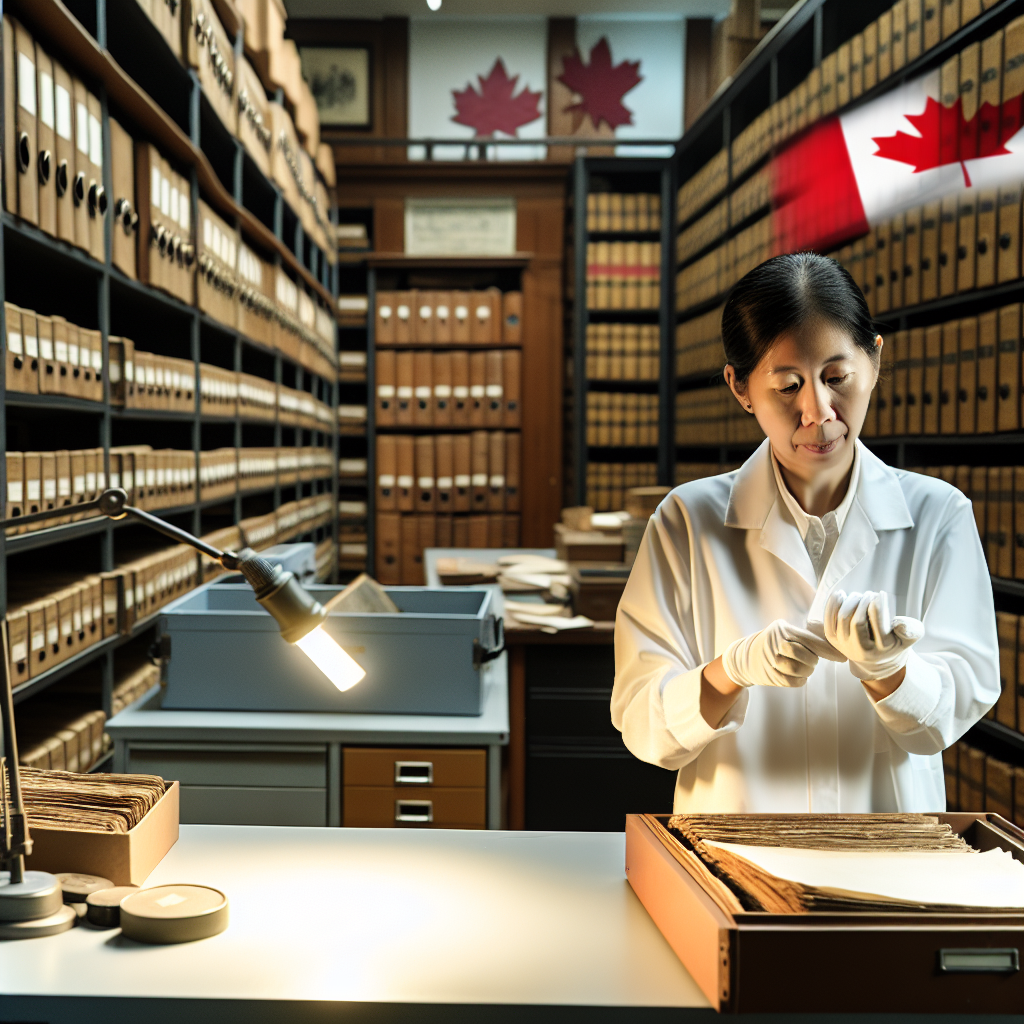Definition and Importance of Archivists in Historical Preservation
Role of Archivists
Archivists play a crucial role in managing historical documents and records.
They ensure that these materials remain accessible to future generations.
Furthermore, they organize, describe, and preserve records to provide context.
Significance of Their Work
The work of archivists supports cultural heritage and historical research.
By safeguarding records, they help communities remember their past.
This preservation fosters a sense of identity and belonging.
Techniques Used by Archivists
Archivists employ various techniques to maintain records effectively.
They assess the value of records and prioritize preservation efforts.
Additionally, they utilize climate control and proper storage methods.
Collaboration with Other Professionals
Archivists often collaborate with historians and librarians.
This teamwork enhances the preservation and accessibility of historical materials.
They also engage with local communities to promote awareness.
Challenges Faced by Archivists
Archivists encounter numerous challenges in their work.
Digital preservation has become increasingly important as technology evolves.
Additionally, funding constraints can limit their efforts.
Despite these challenges, they remain committed to their mission.
Historical Background of Archival Science
Origins of Archival Practices
Archival practices date back to ancient civilizations.
Initially, people stored important documents in temples and government buildings.
These locations provided safety and accessibility for critical information.
As societies evolved, so did the methods of record keeping.
Development of Modern Archival Science
The 19th century marked a significant turning point in archival science.
In this period, professionals began formalizing archival practices.
Historians and record keepers established the foundations of modern archiving.
This led to the creation of specialized institutions dedicated to preserving records.
Significant Archival Movements
During the 20th century, several movements shaped the field.
Unlock Your Career Potential
Visualize a clear path to success with our tailored Career Consulting service. Personalized insights in just 1-3 days.
Get StartedInternational organizations, like the International Council on Archives, emerged.
These groups advocated for standardized practices in record management.
They emphasized the importance of preserving cultural heritage.
Impact of Technology on Archiving
The digital age introduced new challenges and opportunities for archivists.
Technological advancements transformed how records are created and stored.
Archivists adapted by developing digital preservation methods.
They now manage both physical and digital archives effectively.
Current Trends in Archival Science
Today, archivists focus on accessibility and public engagement.
They promote the use of archives for education and research.
Moreover, collaboration with communities enhances preservation efforts.
These trends reflect a shift towards making history more inclusive.
Roles and Responsibilities of Archivists in Collecting Archives
Importance of Collecting Archives
Archivists play a crucial role in preserving historical records.
They ensure that valuable documents are maintained for future generations.
Through their efforts, communities can access significant cultural information.
In addition, these records provide insights into societal changes over time.
Identifying Relevant Materials
Archivists actively seek out materials relevant to their collections.
They evaluate documents for historical significance and authenticity.
This involves assessing the provenance of each item collected.
Furthermore, archivists build relationships with individuals and organizations.
This collaboration fosters access to unique and often overlooked materials.
Establishing Collection Policies
Archivists develop collection policies to guide their work.
These policies outline what types of materials are needed and why.
They also consider the community’s needs and historical context.
By establishing clear guidelines, archivists streamline their collection activities.
Preservation Techniques
After collecting archives, preservation becomes a priority.
Archivists employ various methods to protect documents from deterioration.
They use acid-free materials and controlled environments for storage.
Regular assessments ensure that collection conditions remain optimal.
Cataloging and Accessibility
Cataloging is essential for effective archival management.
Archivists classify and organize materials for easy retrieval.
This process enhances accessibility for researchers and the public.
Additionally, digital technologies aid in providing online access.
Archivists continuously update these systems to meet users’ needs.
Educational Outreach
Archivists also engage in educational outreach within their communities.
They conduct workshops and training sessions to promote archive understanding.
By sharing knowledge, they encourage the use of archival materials.
Furthermore, collaboration with educators enhances student learning experiences.
Advocating for Historical Preservation
Archivists advocate for the importance of historical preservation.
They raise awareness about the significance of archives within society.
Through public programming, archivists engage diverse audiences.
Ultimately, their work fosters appreciation for historical resources.
Learn More: Tips for Transitioning from Hobbyist to Professional Photographer
Techniques and Methods Used by Archivists for Preservation
Archival Storage Practices
Archivists carefully select appropriate storage environments for records.
Climate control is essential for maintaining temperature and humidity levels.
Darkness protects sensitive materials from light damage.
They utilize acid-free boxes and folders to ensure chemical stability.
Additionally, archivists label materials clearly for easier identification.
Digital Preservation Strategies
Digital assets require unique preservation methods to ensure longevity.
They often implement regular data backups to prevent loss.
Archivists convert obsolete formats into current, accessible ones.
Furthermore, they utilize metadata to enhance information retrieval.
They monitor technological changes to adapt preservation strategies accordingly.
Cataloging and Organization
Effective cataloging enables efficient access to archival materials.
Archivists categorize records based on content, date, or creator.
They utilize standardized descriptions to maintain consistency.
Moreover, digitization of finding aids increases public accessibility.
Community Engagement and Education
Archivists engage the community through educational programs.
Workshops and exhibitions promote awareness of local history.
They encourage public participation in archival projects.
This fosters a connection between community members and historical materials.
Additionally, social media channels serve as platforms for outreach.
Delve into the Subject: Tools and Software Every Graphic Designer Should Know
The Relationship Between Archivists and Other Historical Professionals
Collaborative Efforts in Preservation
Archivists play a vital role in preserving historical records.
They collaborate with historians to ensure accurate representation of the past.
This teamwork enhances the quality of historical research and documentation.
Supporting Research and Education
Archivists provide essential resources for researchers and educators.
Their expertise helps in locating and interpreting archival materials.
This support aids in developing curricula and conducting research projects.
Engagement with Cultural Institutions
Archivists frequently interact with museums and libraries.
They assist in organizing exhibitions that showcase historical documents.
Such initiatives promote public interest in history and culture.
Preserving Diverse Narratives
Archivists advocate for the inclusion of underrepresented voices.
They work to archive materials from various cultural communities.
This effort enriches the historical narrative and fosters inclusivity.
Utilizing Technology for Access
Modern archivists embrace digital tools to broaden access.
They digitize records to make them available online.
This innovation improves outreach and engagement with the public.
Networking with Other Professionals
Archivists often network with librarians, curators, and educators.
These connections foster knowledge sharing and professional development.
Additionally, they collaborate on projects that benefit from diverse expertise.
See Related Content: Building a Successful Career as a Digital Content Creator

The Impact of Technology on Archival Practices
Digital Transformation in Archiving
Technology has revolutionized how archivists manage records.
Digitization allows archivists to preserve materials more effectively.
Moreover, it enhances access for researchers and the general public.
For instance, scanning paper documents converts them into digital files.
This process significantly reduces physical storage requirements.
Implementing Digital Archives
Establishing digital archives involves substantial planning and resources.
Archivists often utilize specialized software for database management.
These tools help organize and retrieve information quickly.
Additionally, metadata plays a crucial role in digital archiving.
It ensures users can locate and understand the context of materials.
Preserving Digital Records
Digital preservation requires ongoing maintenance and management strategies.
Archivists must prepare for potential technology obsolescence.
Regularly updating formats helps maintain accessibility over time.
Furthermore, developing backup protocols protects against data loss.
Enhancing Public Engagement
Technology increases public engagement with archival collections.
Online platforms allow broader access to materials anytime, anywhere.
Virtual exhibitions also bring historical records to a larger audience.
Thus, archivists can foster interest and increase visibility for their collections.
Collaboration and Sharing Resources
Technology facilitates collaboration among archivists and institutions.
Shared databases enhance resource accessibility and minimize duplication.
Additionally, these collaborations can lead to joint projects and initiatives.
Professional networks enable archivists to share best practices effectively.
Explore Further: Education and Training Requirements for Archivists
Challenges Faced by Archivists in Modern Society
Information Overload
Archivists struggle with the vast amount of data generated daily.
This information overload complicates their efforts to preserve relevant materials.
Additionally, digital formats create unique challenges for traditional archiving methods.
Rapidly Evolving Technology
Technology evolves quickly, impacting archival practices significantly.
Archivists must constantly update their skills and tools to stay effective.
Moreover, the shift to digital archives requires a deep understanding of software.
Resource Constraints
Many archives face budget cuts that limit their operational capabilities.
As a result, archivists often work with insufficient staffing and funding.
This scarcity affects the quality of preservation and access to archives.
Public Awareness and Engagement
There is a general lack of awareness about the role of archivists.
This gap makes it challenging to garner public support for archiving initiatives.
Furthermore, many communities do not recognize the importance of historical preservation.
Ethical Dilemmas
Archivists frequently confront ethical challenges in their work.
They must navigate issues regarding privacy and access to sensitive materials.
Additionally, they face dilemmas about what to preserve and what to discard.
Maintaining Relevance in a Digital Era
Archivists need to find ways to stay relevant in today’s fast-paced environment.
This involves adopting new technologies and approaches for engagement.
They also must address changing expectations from the public and researchers.
The Future of Archival Work and Its Role in Cultural Heritage
Evolving Responsibilities of Archivists
Archivists play a crucial role in preserving cultural heritage.
They manage collections that document society’s history.
As digital records become prevalent, their responsibilities evolve.
They must adapt to new technologies and methodologies.
Moreover, archivists ensure accessibility to diverse communities.
This access fosters awareness and appreciation of history.
Integration of Technology
Technology greatly enhances archival practices.
Digital preservation tools safeguard fragile materials.
These tools allow for better organization and retrieval of records.
Additionally, artificial intelligence aids in cataloging and analysis.
As a result, archivists leverage technology for efficient workflows.
They can reach broader audiences through online platforms.
Collaboration with Cultural Institutions
Collaboration among cultural institutions strengthens archival work.
Archivists partner with libraries, museums, and universities.
This collective effort enhances resource-sharing and expertise.
Furthermore, joint initiatives promote public engagement with history.
These collaborations lead to more comprehensive historical narratives.
Emphasis on Education and Advocacy
Education remains a vital aspect of archival work.
Archivists provide training on historical research methods.
They advocate for the importance of preserving history.
Public outreach initiatives raise awareness about archival resources.
Consequently, they empower communities to value their heritage.
Archivists also influence policy-making related to cultural preservation.
Addressing Ethical Considerations
Ethical considerations guide archival practices.
Archivists navigate complex issues surrounding privacy and access.
They ensure that marginalized voices are represented in collections.
By doing so, they promote inclusive narratives of history.
Furthermore, they commit to transparency in their processes.
This builds trust and accountability in archival institutions.
Additional Resources
How to Do Oral History | Smithsonian Institution Archives
Preservation of video games and their role as cultural heritage …




